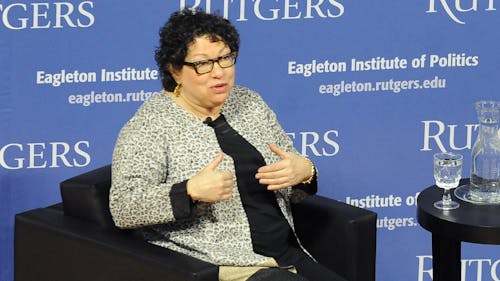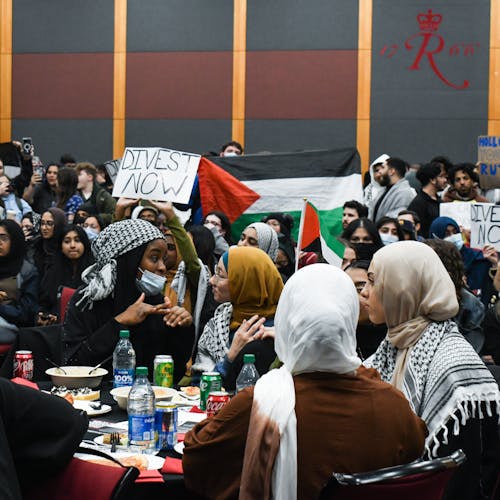Supreme Court Justice Sonia Sotomayor visits Rutgers to speak about diversity on the court

In 2009, a 13-year-old girl in an Arizona school was called into her vice principal’s office and strip-searched for being suspected of bringing aspirin to the premises.
The Supreme Court case, Safford v. Redding, exemplifies the importance of diversity in the court, Supreme Court Associate Justice Sonia Sotomayor told the Rutgers Athletics Center Monday afternoon.
“Justice (Ruth Bader) Ginsburg was reported to have said that she feared that some of her male colleagues did not understand how it felt to be a 13-year-old girl, and how important the sense of body privacy and (sensitivity) at that time,” Sotomayor said.
Amid a captivated audience, Sotomayor shared the wisdom she gained from her years in the field of law and her experience as the Supreme Court’s first Hispanic and third female justice. Her comments arrived only a week after she called for more diversity in the nation’s highest court.
As one of nine Supreme Court Justices, Sotomayor said she is among those making decisions that affect every person in the country.
“To be able to represent all of these people, it’s helpful when the justices have present among themselves as much and as varied of experiences as the country does,” she said. “(It) is a personal ability to explain an argument that your colleagues haven’t had that your voice can let them see in a different way.”
As a child growing up in the South Bronx, Sotomayor said she did not know the Supreme Court existed. Celina Baez, Sotomayor’s mother, hoped her daughter would pursue journalism — to write and travel the world.
“You cannot dream about what you don’t know,” she said. “(When nominated,) that sense of being blessed was very real.”
But Sotomayor, who served on the Southern District of New York Court from 1992-1998, said being appointed to the Supreme Court by President Barack Obama in 2009 came with pressures.
Working on lower-level courts, Sotomayor said she could be comforted by the fact that the Supreme Court would check the mistakes in her decisions. But now, as a Supreme Court justice, this is not the case.
Throughout the hour-long talk, Sotomayor engaged audience members by leaving her seat to walk up to the highest stands and shake hands at the half-filled Rutgers Athletic Center while answering questions from Rutgers—New Brunswick, Newark and Camden students.
Sotomayor’s talk was originally supposed to be held at Trayes Hall inside the Douglass Student Center, said University President Robert L. Barchi. But it was moved to the RAC in order to accommodate the high demand for admission.
“The line coming in here was remarkable (and) orderly,” Barchi told the audience. “It was longer than anything I’ve seen at Rutgers that did not involve free food — I’ve never seen those seats in the back filled either.”
Sotomayor was the ideal speaker for a discussion about civic engagement because she spent her whole life working to serve the public, Barchi said. Plus many Rutgers students can relate to her because she was the first in her family to attend college.
It was an honor for the Eagleton Institute of Politics to host Sotomayor’s visit to Rutgers, said Ruth Mandel, director of the Institute.
Mandel said she was inspired to invite the Supreme Court justice to Rutgers after reading Sotomayor’s book, “My Beloved World.”
“This is what you dream about when you write a fan letter,” she said.
When asked by a student if she feels any pressure to perform well as the first Latina Supreme Court justice, Sotomayor said she sets her own standards by doing what she deems to be an important contribution to society.
Someone can only be a leader if they live their life by example and by striving to show others how to become better people, she said.
“You define the agenda, you look at what needs to be done in the world and what you think your talents can help bring to the world,” she said. “If you do good things, people will help you do good things.”
Dan Corey is the editor-in-chief of The Daily Targum. He is a Rutgers Business School sophomore majoring in marketing and journalism and media studies. Follow him on Twitter @danielhcorey for more stories.
Avalon Zoppo is the managing editor of The Daily Targum. She is a School of Arts and Sciences sophomore majoring in political science. Follow her on Twitter @AvalonZoppo for more stories.



